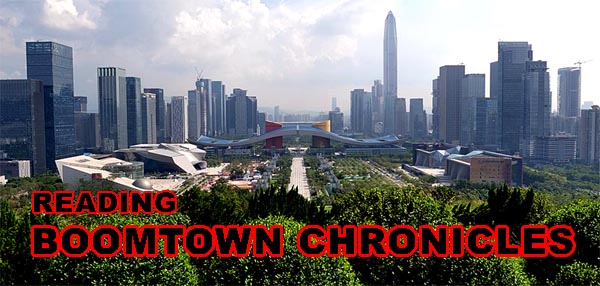 |
| Shenzhen, the Boomtown (Wikipedia) |
Note: Between Lesson #01-128 and #01-207, I wrote 72 lessons explaining expressions in articles published in the Shenzhen Daily. Read more about "Reading Boomtown Chronicles."
Get Ready: Have you ever had to work, study, or live in makeshift conditions?
Boomtown Chronicles Part II - published Monday, June 23, 2008 (cont.)
- the Zones would "have to... blaze a new trail"
blaze a trail: Deng Xiaoping, Shenzhen's founder, used another metaphor for innovation. He said that, because the Central Government didn't have enough money to support the development of the new "Special Economic Zones" (Shenzhen was just one of several founded at the time) the Zones would "have to... blaze a new trail."
"Blazing a trail" is a reference to creating a trail in the woods. Someone would mark the trail by cutting some bark off of the trees along the way. These marks were called "blazes," as the white interior of the tree would seemingly shine in the dark forest. Doing this was called "blazing a trail" or "trailblazing," marking the way for those who came after.
- "then followed a ruckus..."
ruckus: a disturbance or noisy argument. In September of 1980, the Central Government loaned Shenzhen 30 million yuan. Wu Nansheng, formerly Guangdong Party chief and by then Party chief of Shenzhen, said that the gift created some trouble; after celebrating this kindness, "then followed a ruckus about how the money should be used." Ruckus is a word of unknown origin. Some speculate that it is "ruction + rumpus," both rare words. "Ruction" is related to "insurrection," a kind of riot or public disturbance. "Rumpus" is a loud noise. (When I was a kid, my aunt and uncle had a "rumpus room," a place separate from the main house which was used for noisy parties and other fun activities.)
- "a makeshift room"
makeshift: "temporary" or "dashed together." The article describes "a makeshift room" where engineers and city leaders met in October 1980--probably a common occurrence in early Shenzhen. Here it might mean a room usually used for some other purpose, pressed into service as a meeting room.
- Luohu would be the best place for Shenzhen to earn its "first pot of gold"
pot of gold: a somewhat unusual metaphor for money. Engineers in the aforementioned meeting said that Luohu would be the best place for Shenzhen to earn its "first pot of gold" because it was near Hong Kong. It's commonly used when discussing what's found at the "end of the rainbow."
- After the meeting was "deadlocked," Wu Nansheng "broke the ice."
deadlocked: stuck, with no hope of resolution.
broke the ice: "broke the deadlock" or "broke the tie." "Breaking the ice" usually implies the initiation of some new relationship or endeavor. "Nobody wanted to go first, but I decided to break the ice by giving the first presentation."
--------Read more: https://en.wikipedia.org/wiki/Shenzhen
Practice: Choose the correct term to fill in the blank in the sentence below:
- blaze a trail
- broke the ice
- deadlocked
- makeshift
- pot of gold
- ruckus
- The managers had to create a ________ plan until a more permanent one could be devised.
- Someone needs to create a new market and ________ for the companies who come after.
- The selection committee was ________ until someone pointed out the benefits of a compromise candidate.
- Call security! Someone's causing a ________ in the lobby!
- Miriam ________ by asking the speaker the first question.
- Sometimes it seems like everyone's just searching for a ________.
Answers are in the first comment below.
Submitted to the Shenzhen Daily for July 10, 2008


Answers to the Practice: 1. b; 2. e; 3. c; 4. a; 5. f; 6. d
ReplyDelete